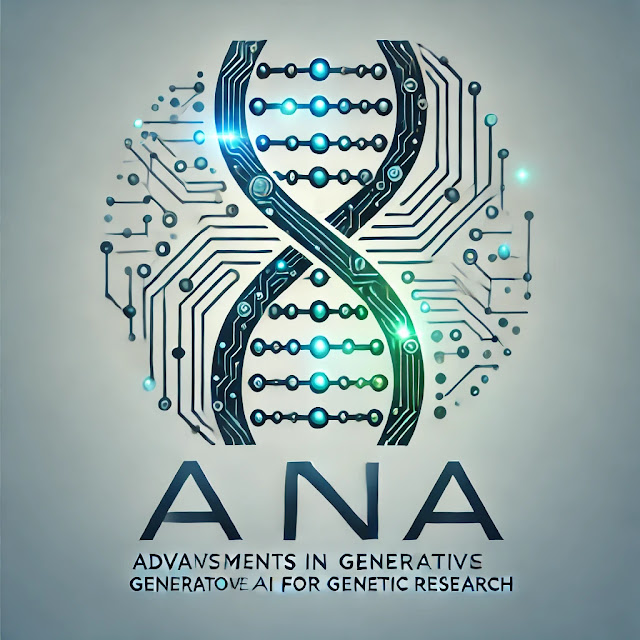Advancements in Generative AI for Genetic Research:
Introduction:
In a world where technology consistently pushes the boundaries of possibility, generative artificial intelligence (AI) has emerged as a transformative force across numerous fields. Among these, genetic research stands out as an area profoundly influenced by the capabilities of generative AI. Imagine a future where the mysteries of our DNA are unraveled with precision, diseases are predicted and prevented before they manifest, and the secrets of life itself are laid bare. This future is rapidly becoming a reality, thanks to the symbiotic relationship between AI and genetics.
But what makes generative AI so revolutionary for genetic research? How does it work, and why are researchers around the globe embracing it with such enthusiasm? This article delves into the fascinating advancements of generative AI in genetic research, unveiling the innovations that are reshaping science and medicine.
What is Generative AI?
Generative AI refers to algorithms, often based on neural networks, designed to generate new data from existing datasets. Unlike traditional AI systems that classify or predict based on input, generative AI creates something novel. In the context of genetic research, this could mean generating synthetic DNA sequences, simulating genetic mutations, or predicting how genes interact.
How Generative AI Revolutionizes Genetic Research
Generative AI's role in genetics is multifaceted, encompassing diverse applications that enhance understanding and discovery. Let’s explore the most impactful advancements:
1. Synthetic Data Generation
One of the major challenges in genetic research is obtaining sufficient high-quality data. Generative AI models, such as Generative Adversarial Networks (GANs), can simulate genetic datasets that mimic real-world diversity.
- Benefit: Enables researchers to train algorithms on vast, diverse data without needing expensive and time-consuming lab experiments.
2. Predictive Modeling of Genetic Diseases
Generative man-made intelligence succeeds at distinguishing designs inside complex datasets. It can predict the likelihood of genetic disorders by analyzing DNA sequences.
- Benefit: Early detection and personalized treatment plans for conditions such as cystic fibrosis, Huntington’s disease, and cancer.
3. Accelerated Drug Discovery
By simulating the effects of genetic mutations and drug interactions, generative AI speeds up the development of gene therapies.
- Benefit: Reduces the time and cost required to bring lifesaving treatments to market.
4. Gene Editing and CRISPR Enhancement
AI models can optimize CRISPR (Clustered Regularly Interspaced Short Palindromic Repeats) technology by predicting the most effective edits for specific genes.
- Benefit: Enhances accuracy and minimizes off-target effects, making gene editing safer and more efficient.
Generative AI and the Study of Rare Genetic Diseases
Rare genetic diseases often lack extensive research due to their low prevalence. Generative AI fills this gap by simulating mutations and analyzing hypothetical scenarios.
- Example: Generative models can recreate how a rare mutation affects protein structure, aiding in the development of targeted therapies.
Ethical Considerations in Using Generative AI for Genetics
With great power comes great responsibility. While generative man-made intelligence offers colossal commitment, its application in hereditary qualities brings up moral issues.
- Information Security: Guaranteeing that manufactured information doesn't accidentally uncover individual data
- Bias and Fairness: Avoiding AI models trained on biased datasets that could reinforce existing inequalities in healthcare.
- Dual Use Concerns: Preventing misuse of generative AI for harmful purposes, such as bioengineering pathogens.
Efforts are underway to establish guidelines and frameworks to address these challenges, ensuring that advancements are aligned with societal values.
The Future of Generative AI in Genetic Research
The combination of generative man-made intelligence into hereditary examination is still in its beginning phases, however its direction focuses to noteworthy conceivable outcomes:
1. Personalized Medicine
Tailoring treatments based on an individual's genetic makeup will become the norm, thanks to AI’s ability to decode and interpret DNA with unprecedented precision.
2. Evolutionary Studies
Generative AI could simulate evolutionary processes, offering insights into how species adapt and evolve over time.
3. Global Collaboration
AI-powered platforms are making genetic data accessible to researchers worldwide, fostering collaboration and accelerating discovery.
4. Artificial DNA Design
Designing DNA sequences for specific purposes, such as creating crops resistant to climate change or producing biofuels.
FAQs: Advancements in Generative AI for Genetic Research
1. How is generative AI used in genetic research?
Generative AI creates synthetic datasets, predicts genetic mutations, simulates disease models, and optimizes gene-editing tools like CRISPR.
2. Can generative AI predict genetic diseases?
Yes, generative AI analyzes DNA sequences to identify patterns that indicate a predisposition to genetic disorders.
3. What are the ethical concerns surrounding generative AI in genetics?
Key concerns include data privacy, bias in AI models, and the potential misuse of technology for harmful purposes.
4. How does generative AI improve drug discovery?
By simulating genetic mutations and their interactions with drugs, generative AI reduces the time and cost of developing new treatments.
5. What role does AI play in studying rare genetic diseases?
AI generates simulations and analyzes hypothetical scenarios, enabling research into diseases with limited real-world data.
6. Will generative AI replace traditional genetic research methods?
No, generative AI complements traditional methods, enhancing efficiency and expanding the scope of possibilities in genetic research.
Conclusion
The synergy between generative AI and genetic research marks a new era of innovation. By bridging the gaps between data, discovery, and application, generative AI is empowering scientists to tackle challenges once deemed insurmountable. As this technology continues to evolve, its potential to transform healthcare, agriculture, and even our understanding of life itself remains boundless.
The question is no longer if generative AI will revolutionize genetic research, but rather how soon—and to what extraordinary extent—it will reshape our future.





0 Comments